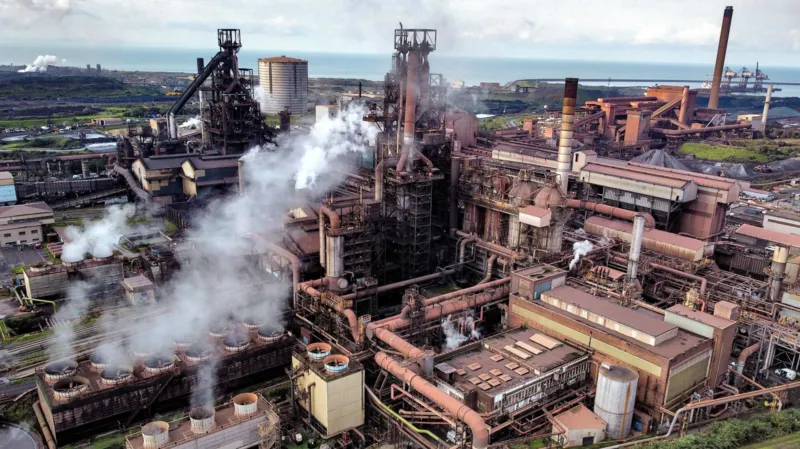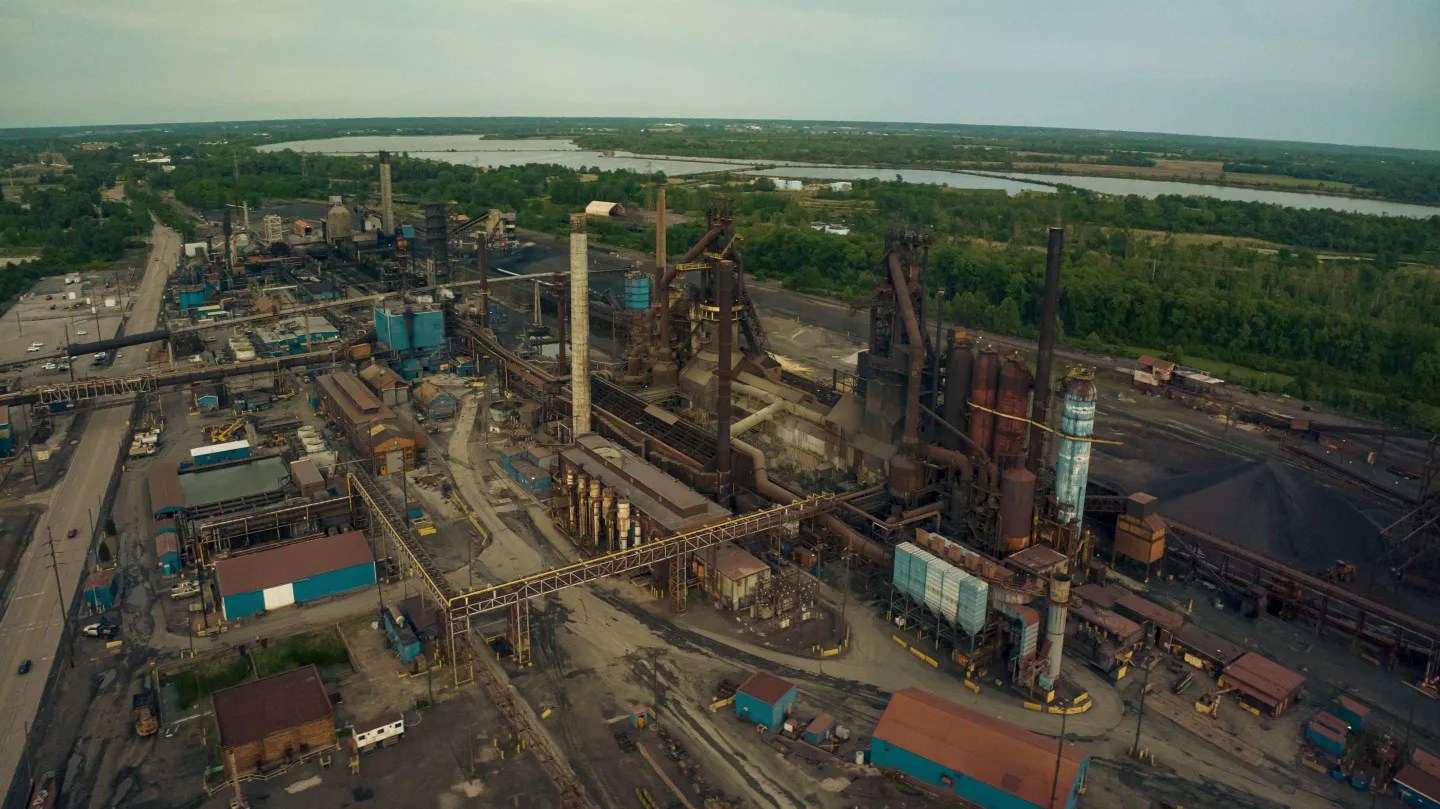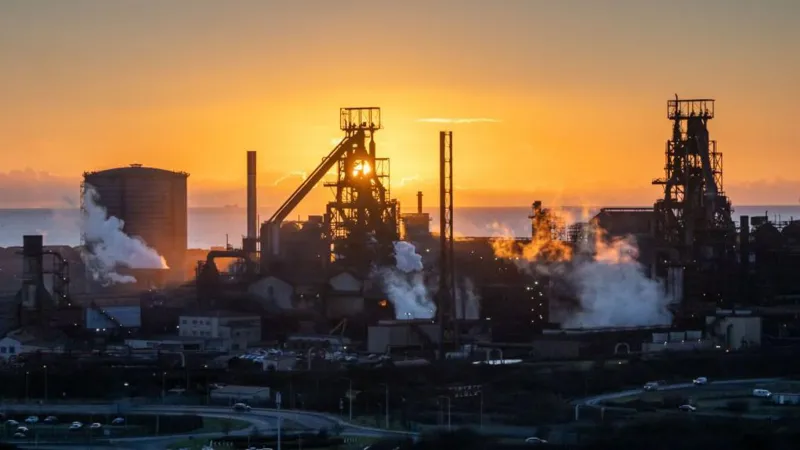Workers at Tata Steel have been informed that the company is taking steps that could lead to the cessation of operations at the Port Talbot plant by July 7 due to an upcoming strike by the Unite trade union. Originally, the company had planned a phased shutdown of its operations, with one of the blast furnaces scheduled to be taken offline by the end of June and the second one by September.
However, in light of the planned strike by Unite starting on July 8, Tata Steel has communicated to the Port Talbot workers that the strike creates significant uncertainty. The company has expressed concerns that it will no longer be able to ensure that it has sufficient resources to maintain safe and stable operations during this period of industrial action. This has led to the decision to potentially accelerate the shutdown timeline by three months.
In response to Tata Steel’s announcement, the Unite union has stated that the company’s move to shut down or pause the blast furnaces earlier than planned is just the latest in a series of threats aimed at the union and its members. Unite has made it clear that this decision will not deter them from their planned strike actions and their ongoing efforts to address their grievances.
Meanwhile, the Welsh government has also weighed in on the situation, stating firmly that it cannot and will not support the closure of both blast furnaces at the Port Talbot plant. The government has emphasized the importance of these operations to the local economy and the broader implications for the community if the plant were to cease operations.

Unite union workers are demonstrating because they disagree with Tata Steel’s decision to reduce 2,800 jobs.
About 2,800 workers at Tata Steel are set to lose their jobs when the company closes both of its blast furnaces in Port Talbot by the end of September. This decision comes after Tata Steel indicated that if a strike affected the safety or stability of its operations, it would have no choice but to speed up its closure plans.
A spokesperson for Tata Steel explained the situation in more detail: “Following the announcement by the Unite union to call a strike starting on July 8, Tata Steel feels compelled to initiate legal action to challenge the validity of Unite’s ballot. In the coming days, if we cannot be certain that we can safely and stably continue operating our facilities during the strike, we will have no choice but to pause or stop heavy end operations at the Port Talbot site, which includes both blast furnaces. This is not a decision we take lightly, as we recognize it would be extremely costly and disruptive throughout our supply chain. However, the safety of people on or around our sites will always take priority over everything else.”
Tata Steel has called on the Unite union to withdraw its industrial action and to join the Community and GMB unions in considering the company’s proposal. Tata Steel’s proposal includes what they describe as “generous employee support packages, training, and skills development.” The company is urging cooperation to avoid the severe impacts of the strike and to ensure a safer and more stable work environment.
Tata Steel also acknowledged the significant impact that the restructuring will have on many of its employees and contractors. Despite these challenges, the company emphasized its commitment to a fair transition for affected workers. Tata Steel stated that it hopes for a “long and sustainable future” in the UK, and it remains dedicated to supporting its workforce through these difficult changes. This commitment includes providing ample support and opportunities for training and skill development to help employees transition to new roles or careers.
In conclusion, Tata Steel’s decision to close its blast furnaces in Port Talbot by the end of September will result in the loss of approximately 2,800 jobs. The company is taking legal action in response to the Unite union’s strike and has urged the union to reconsider its stance in light of the proposed support packages and the broader implications for safety and operational stability. While acknowledging the hardships this restructuring will cause, Tata Steel is focused on ensuring a fair and supportive transition for its employees and is optimistic about securing a sustainable future in the UK.

The company planned to close one blast furnace by the end of June and the other one by September.
Sharon Graham, the general secretary of Unite, emphasized that the union is “fighting for the future of the steel industry.” She highlighted that Unite has successfully secured substantial investment from the Labour Party aimed at safeguarding jobs within the industry.
In recent developments, Tata has announced its decision to shut down or pause its blast furnaces three months earlier than initially planned. Sharon Graham criticized this move, describing it as just another in a series of threats that will not deter the union’s efforts. She reaffirmed that the Unite campaign is dedicated to ensuring the long-term future of steelmaking in the country, specifically for thousands of workers in Port Talbot and South Wales. The goal is not merely to preserve jobs temporarily but to secure the industry’s future sustainably.
Unite is urging the key decision-makers in Mumbai to recognize that the investment secured will benefit both the company and its workers. They believe that this investment is crucial for the continued success and viability of steelmaking operations.
The GMB union has also voiced its concerns, calling on Tata to “step back” from this “irreversible decision” and instead focus on safeguarding the steelmaking assets. GMB’s national officer, Charlotte Brumpton-Childs, pointed out that the upcoming general election has the potential to bring about significant changes, suggesting that the political landscape could influence future decisions. She mentioned that GMB’s next actions will be determined by its members, indicating a democratic approach to their strategy moving forward.
Similarly, the Community union condemned Tata’s decision to bring forward the closure, labeling it as “unacceptable.” They continue to support the Labour Party’s call for Tata to refrain from making irreversible decisions before the general election. The Community union’s stance is that such decisions should be postponed until after the election, allowing for a more stable and informed approach to the future of the steel industry.
In summary, the unions are united in their efforts to protect the steel industry and its workers, calling for responsible decision-making and significant investment to secure a sustainable future. They are collectively urging Tata and other stakeholders to consider the long-term implications of their actions and to work towards a solution that benefits both the company and its workforce.

The company planned to close one blast furnace by the end of June and the second one by September.
First Minister Vaughan Gething described the news from Tata as “extraordinary” and urged the company to wait for the result of next week’s general election before making any decisions. In a detailed statement, Mr. Gething expressed deep concern over the potential shutdown of Blast Furnaces 4 and 5 at Port Talbot, which he said would cause significant anxiety among the workforce, their families, and the surrounding community. He emphasized that the Welsh government could not and would not support the closure of both blast furnaces, stressing the severe impact such a move would have on local employment and the regional economy.
Mr. Gething also criticized the timing of Tata’s decision, noting that taking action while the nation was focused on the general election did nothing to alleviate the situation. He argued that it added unnecessary stress and confusion during an already tense period, urging Tata to delay any drastic measures until after the election results were known and a clearer path forward could be discussed.
Samuel Kurtz, the Welsh Conservative shadow minister for economy and energy, also weighed in, describing the announcement as disappointing news that would cause additional distress to communities already dealing with numerous challenges. He criticized Tata for failing to show goodwill to their workforce during such a critical time, accusing the company of neglecting the needs and well-being of its employees.
Kurtz further criticized the Welsh Labour government, accusing it of merely paying lip service to Tata’s workforce. He pointed out that the government had failed to contribute any financial support to the transition board, a body that could potentially help manage the changes and mitigate the impact on workers. Additionally, he highlighted that the UK Labour Party’s manifesto offered no concrete solutions or commitments to support Port Talbot’s steelworkers, suggesting a lack of genuine concern or actionable plans from the party.
Luke Fletcher, Plaid Cymru’s spokesperson for the economy, provided a different perspective, advocating for a more radical approach. He argued that the steel industry should be brought under the control of the next UK government, which Plaid Cymru believes will be led by Sir Keir Starmer. Fletcher emphasized that mere slogans like “Save our steel” were insufficient and that tangible actions were necessary to preserve the industry. He called for immediate nationalization of the steel industry, insisting that the incoming Labour government must put words into action from day one to truly protect and revitalize the steel sector.
In summary, the news from Tata has elicited strong reactions from various political figures, each highlighting the severe implications for the workforce and community while advocating for different approaches to address the crisis. The overarching sentiment is one of urgency and the need for decisive action to safeguard the future of Port Talbot’s steel industry.
Published: 28th June 2024
Also Read:
How do I register to vote in the 2024 UK election?
Millions urged to register to vote on deadline day
How AI Enhances Sales Techniques and Marketing Strategies
Disclaimer: The content provided by “The UK Times” online news channel is for informational purposes only. While we strive for accuracy and reliability, we do not guarantee the completeness or timeliness of the information. The opinions expressed are those of the authors and do not necessarily reflect the views of The UK Times.






















